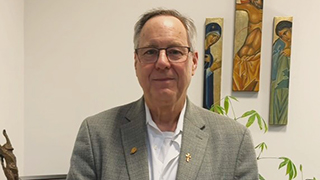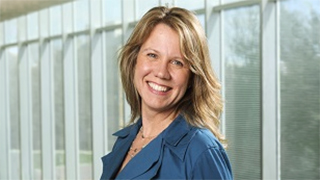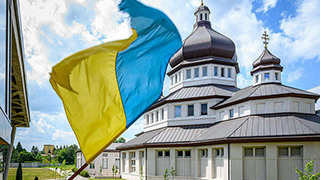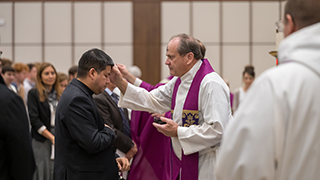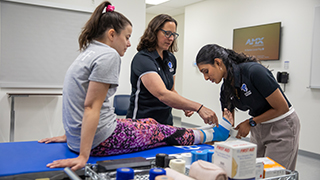Rabbi Alan Brill, Ph.D., Discusses Jewish-Christian Theological Dialogue in “A Jewish View of Contemporary Ideas of the Trinity” Lecture - Seton Hall University
Monday, November 28, 2022
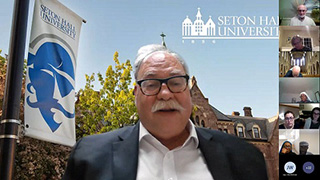
The 29th Msgr. John M. Oesterreicher Memorial Lecture was presented online October 27, 2022 on Microsoft Teams. The guest speaker was Rabbi Alan Brill, who holds the Cooperman/Ross Endowed Chair for Jewish-Christian Studies and is the director of the Jewish-Christian Studies (JCST) Graduate Program at Seton Hall University.
"A Jewish View of Contemporary Ideas of the Trinity"
Rabbi Brill delivered a wide-ranging survey. His topic, "A Jewish View of Contemporary
Ideas of the Trinity," is part of a larger project scheduled for publication by Fortress
in 2023.
The aim of Brill's lecture was to address two primary questions: 1) is the Jewish view of God and the Christian doctrine of the Trinity irreconcilable? and 2) what can we glean from comparing the theological insights in both religions?
Different theological views with mutual influence
Distinguishing between the "polemical" and "post-polemical" eras of dialogue between
Jews and Christians, Brill first outlined some of the complex differences of Jewish
theological notions of God in Late Antiquity, the Medieval era and the Post-Vatican
II period.
Moving into the 20th century and contemporary times, Rabbi Brill focused on the Trinitarian thought of German Catholic theologian Karl Rahner and the German Protestant Jürgen Moltmann to highlight various similarities and differences between Judaism and Christianity.
Brill recognized there are differences between the Jewish view of God and the Christian doctrine of the Trinity, which should not be ignored or minimalized. However, these elements are not opposed absolutely to one another in a "zero-sum way, either historically or conceptually." As he noted, "They have had mutual influence on each other, but in the end the two religions remain as two distinct religions with different theological views…"
Comparisons can lead to greater understanding
Rabbi Brill concluded that, in our "post-polemical" time, such theological comparisons
between Judaism and Christianity will bear great fruit as we continue to strive to
understand one another:
"Jewish scholars now speak regularly in Christian schools; Christian scholars speak in Jewish schools. We both regularly read each other's works – and many Jews have degrees that include comprehensives on Christianity, and Christians have comprehensives on Judaism. This talk would not have occurred 17 years ago, when the elder scholars on both sides still were learning about each other and still saw irreconcilable differences. Now we have to start comparing and I hope this talk will be the start of many conversations of even greater understanding."
A stimulating question-and-answer period followed, and Rachel Slutsky, Ph.D., closed the event by offering the benediction of Psalm 133. Slutsky is the Monsignor John Oesterreicher Visiting Assistant Professor of Jewish Studies and Jewish-Christian Relations in Antiquity at Seton Hall University.
How to access the lecture
The Institute of Judaeo-Christian Studies wants to thank everyone who participated
in this theological dialogue about the mystery of God. The Institute invites you to
learn from Rabbi Brill’s extensive research and knowledge by accessing the recording
of his lecture, including the Q&A portion, on the Institute's eRepository, which can
be found here.
About the Institute of Judaeo-Christian Studies
The Institute of Judaeo-Christian Studies (IJCS) promotes peacebuilding among people of all faiths through educational programs and
interreligious exchanges and public forums.
Founded in 1953 at Seton Hall University by Monsignor John M. Oesterreicher, IJCS developed the Master's Program in 1975. Along with local students, people from 27 countries across five continents have joined us helping to unite and empower a new, globally diverse generation of scholars, theologians and educators who are dedicated to exploring and promoting their shared values, practices, traditions and peaceful pursuits.
Categories: Faith and Service


